Geneva
Geneva (pronounced /dʒɨˈniːvə/, French: Genève IPA: [ʒənɛv], German: [gɛnf], Italian: Ginevra [dʒiˈneːvra], Romansh: Genevra) is the second biggest city in Switzerland. Only Zürich is bigger. Geneva is the biggest city in Romandy (the French-speaking part of Switzerland).
Geneva | |
|---|---|
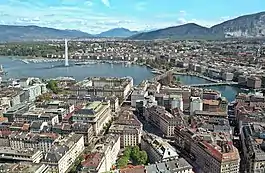 A view over Geneva and the lake | |
 Coat of arms | |
Location of Geneva | |
 Geneva 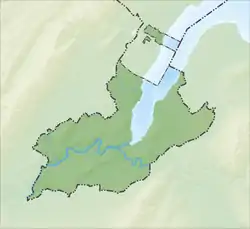 Geneva | |
| Coordinates: 46°12′N 6°09′E | |
| Country | Switzerland |
| Canton | Geneva |
| District | N/A |
| Government | |
| • Executive | Conseil administratif with 5 members |
| • Mayor | La Mairie (list) Sandrine Salerno SPS/PSS (as of June 2019) |
| • Parliament | Conseil municipal with 80 members |
| Area | |
| • Total | 15.92 km2 (6.15 sq mi) |
| Elevation (Pont du Mont Blanc) | 375 m (1,230 ft) |
| Highest elevation (Chemin du Pommier) | 457 m (1,499 ft) |
| Lowest elevation (Le Rhône) | 370 m (1,210 ft) |
| Population | |
| • Total | 201,741 |
| • Density | 13,000/km2 (33,000/sq mi) |
| Demonym(s) | Genevan or Genevese French: Genevois(e) |
| Time zone | UTC+01:00 (Central European Time) |
| • Summer (DST) | UTC+02:00 (Central European Summer Time) |
| Postal code(s) | 1200, or 1201–09 Genève, 1213 Petit-Lancy, 1227 Les Acacias[4] |
| SFOS number | 6621 |
| Surrounded by | Carouge, Chêne-Bougeries, Cologny, Lancy, Grand-Saconnex, Pregny-Chambésy, Vernier, Veyrier |
| Website | ville-geneve SFSO statistics |
Geneva is the capital of the Republic and Canton of Geneva. It is situated where the Rhône River leaves Lake Geneva (called in French Lac Léman).
Geneva is a very important financial and diplomatic center. There are many international organizations in Geneva, including the United Nations and the Red Cross.[5] A 2009 survey states that Geneva has the third highest quality of living in the world (narrowly outranked by Zürich).[6]
Internationally, Geneva is strongly associated with the Geneva Conventions.
History
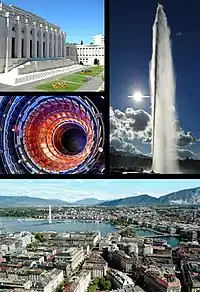
Geneva was first written about as a border town, set up to protect the Roman Empire against the Helvetii. The Romans took the city in 120 B.C. In A.D. 443 it was taken by Burgundy, and with the latter fell to the Franks in 534. In 888 the town was part of the new Kingdom of Burgundy, and with it was taken over in 1033 by the German Emperor.
From 1154 the bishops of Geneva had the status of prince of the Holy Roman Empire, but the counts of Geneva and later the counts of Savoy were "guardians", always ready to take over from the bishops. In 1290 the counts of Savoy got the right to appoint a deputy ruler (vice-dominus) of the diocese, the title of Vidame of Geneva was granted to the family of count François de Candie of Chambéry-Le-Vieux a Chatellaine of the Savoy. The vidominus or Curia Viscount of Geneva, had legal and financial powers over the town, under the control of the Bishop and the Duchy of Savoy.
In 1387 Bishop Adhémar Fabry granted the town its great charter, the basis of its communal self-government, which every bishop on his accession was expected to confirm. The last Count of Geneva died in 1394, and the House of Savoy took over their land. In 1416 the counts became dukes, and kept trying to bring the city of Geneva under their control, often by making members of their own family to Bishops of Geneva. The city protected itself by joining the Swiss Federation (Eidgenossenschaft), uniting itself in 1426 with Berne and Fribourg.
In the Protestant Reformation Bern favoured the new Protestant teaching and demanded liberty of preaching for the Reformers Guillaume Farel and Antoine Froment, but Catholic Fribourg renounced in its union with Geneva in 1511. Later the Protestant leader John Calvin was based in Geneva from 1536 to his death in 1564.
At the Congress of Vienna (1814-15) the territory of Geneva was enlarged to cover 15 Savoyard and 6 French parishes, with more than 16,000 Catholics; at the same time it became a part of the Swiss Confederation. The treaty said that Catholic religion was to be protected, and that no changes were to be made without agreement with the Holy See. Later, Pope Pius VII made the cities of Geneva and Lausanne a new diocese of and part of Geneva diocese that was in France part of the French diocese of Annecy.
The Protestant and Old Catholic churches got money from the city taxes, but the Roman Catholics did not. On 30 June 1907, most of the Catholics of Geneva voted for the separation of Church and State.
Geography
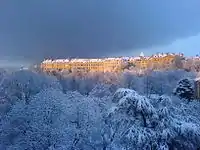
Geneva is located at 46°12' North, 6°09' East, at the south-western end of Lake Geneva, where the lake meets the Rhône River. It is surrounded by two mountain chains, the Alps and the Jura.
The city of Geneva has an area of 15.86 km2 (6.12 sq mi). The area of the Canton of Geneva is 282 km2 (108.88 sq mi).
The altitude of Geneva is 373.6 m. This is the altitude of the largest of the Pierres du Niton, two large rocks in the lake that are used as a reference point for surveying in Switzerland.[7] The second main river of Geneva is the Arve River which flows into the Rhône River just west of the city centre.
Climate
Geneva has a temperate oceanic climate (Cfb in the Köppen climate classification). Winters are cool and generally a little cloudy. During the winter, it is possible to have several days without thawing, and a day or two with severe freezes where the thermometer displays -10 °C. There are several days each month when, if anticyclonic conditions are stable, the clouds may stay for several days. From March, with temperatures rising it feels like summer in late May. However, the rain intensifies and often has a stormy character during the month of May. These may be short but strong storms depositing several centimetres of rain within just a few minutes. Summers are often hot and rather humid, although some may be more changeable, the mornings remain relatively fresh. During the summer season, the rains are less frequent but more intense. This is the season where you most likely get thunderstorms with hail. If the weather in early September is still hot, it cools down quickly to become really cold in November. The morning frosts are then reappearing. Autumn is also the season of mists, and the month of October is often the month with the most fog in the year. The fog can be very intense, restricting vision to less than 100 m in the areas outside the city. The highest temperature ever recorded in Geneva was 39.7 °C (103.5 °F) on 7 July 2015.[8]
Cityscape
Culture
Media
The city's main newspaper is the Tribune de Genève, a daily newspaper founded on 1 February 1879 by James T. Bates, with a readership of about 187,000. Le Courrier, founded in 1868, was originally supported by the Roman Catholic Church, but has been completely independent since 1996. Mainly focused on Geneva, Le Courrier is trying to expand into other cantons in Romandy. Both Le Temps (headquartered in Geneva) and Le Matin are widely read in Geneva, but both actually cover the whole of Romandy.
Geneva is covered by the various French language radio networks of the Swiss Broadcasting Corporation, in particular the Radio Suisse Romande. While these networks cover the whole of Romandy, special programs related to Geneva are sometimes broadcast on some of the local frequencies in the case of special events such as elections. Other local station broadcast from the city, including RadioLac (FM 91.8 MHz), Radio Cité (Non-commercial radio, FM 92.2 MHz), OneFM (FM 107.0 MHz, also broadcast in Vaud), and World Radio Geneva (FM 88.4 MHz), Switzerland's only English-language radio station.
The main television channel covering Geneva is the Radio Télévision Suisse (RTS); while its headquarters are in Geneva, the programmes cover the whole of French-speaking Switzerland. Léman Bleu is a local TV channel, founded in 1996 and distributed by cable. Because Geneva is nearly surrounded by France, many French television and radio channels can be picked up in Geneva.
Entertainment
Theatre
Most theatre in Geneva is in French, however there are several companies that stage regular English productions.
Cinema
Movie going is a favorite activity in Geneva and there are plenty of theaters throughout the city. Most movies are dubbed into French. Because of the number of English speakers in the city movies may also be subtitled.
Restaurants
In has over 1,000 restaurants, so it is the undisputed capital of cuisine in Switzerland. However eating out can be expensive, and many people drive the few kilometres over the border into France where prices are lower.
Traditions and customs
Since 1818, a particular chestnut tree is used as the official "herald of the spring" in Geneva. The sautier (secretary of the Parliament of the Canton of Geneva) observes the tree and notes the day of arrival of the first bud. While this event has no practical impact, the sautier issues a formal press release and the local newspaper will usually mention the news. In 2007, the first bud appeared on 2 March.
Geneva celebrates Jeune genevois on the first Thursday following a Sunday in September. By local tradition, this commemorates when the news of the St. Bartholomew's Day massacre of Huguenots reached Geneva. The Genevois (people of Geneva) joke that the federal equivalent holiday, Jeune fédéral, is celebrated two weeks later on account of the rest of the country being a bit slow on the uptake.
Genevans also traditionally celebrate the failure of a Savoyard attempt to invade the city in 1602. The celebration, which takes place in December, is called L'Escalade, and includes a parade in the Old Town, a marathon, and numerous costume parties across the city. Inhabitants generally eat vegetable stew to commemorate a fictional character called Mère Royaume who is said to have thrown boiling hot soup on the Duke of Savoy's men when they were climbing the walls of the city during the night (hence the name L'Escalade, which means "the climb" in French). Traditionally, children are encouraged to knock on people's doors and sing songs in old Genevan, while teenagers generally throw eggs and flour at each other. Another tradition is to cross a pot made of chocolate filled with marzepan vegetables while saying "and so perished the enemies of the Republic".
Sports
The main sport team in Geneva is Servette FC, a football club founded in 1890 and named after a borough on the right bank of the Rhône River. Servette was the only club to have remained in the top league in Switzerland since its creation in the 1930s; however, in 2005, management problems caused the bankruptcy of the club's parent company, causing the club to be demoted two divisions lower. It is now playing in second division. Geneva is also home of the Genève-Servette Hockey Club, who play in the Swiss Nationalliga A.
Local government
The city of Geneva is divided into 8 "quartiers" or districts, often made up of several conglomerated neighborhoods.[9] On the Left Bank (Rive Gauche) these include Jonction, Centre / Plainpalais / Acacias, Eaux-Vives and Champel while the Right Bank includes Saint-Jean / Charmilles, Servette / Petit-Saconnex, Grottes / Saint-Gervaise and Paquis / Nations.
Demographics
As of 2005, the population of the Commune (city) of Geneva was 185,028, while 441,000 people lived in the Canton of Geneva; around 960,000 people live in the Geneva urban community, which extends into Vaud Canton and neighbouring France.
The population of the Canton is split between 148,500 people originally from Geneva (33.7%), 122,400 Swiss from other cantons (27.6%) and 170,500 foreigners (38.7%), from 180 different countries.[10] Including people holding multiple citizenship, 54.4% of people living in Geneva hold a foreign passport.[11]
While Geneva is usually considered a Protestant city, there are now more Roman Catholics (39.5%) than Protestants (17.4%) living in the Canton. 22% of the inhabitants claim not to be religious, the rest being shared between Islam (4.4%), Judaism (1.1%), other religions and people who did not respond.[12]
Economy
Geneva's economy is mainly services oriented. The city has an important and old finance sector, which is specialized in private banking (managing assets of about 1 trillion USD) and financing of international trade. It is also an important centre of commodity trade.
Geneva hosts the international headquarters of companies like JT International (JTI), Mediterranean Shipping Company, Serono, SITA, Société Générale de Surveillance and STMicroelectronics. Many other multinational companies like Caterpillar, DuPont, Electronic Arts, Hewlett-Packard, INVISTA, Procter & Gamble and Sun Microsystems have their European headquarters in the city too.
There is a long tradition of watchmaking (Baume et Mercier, Chopard, Franck Muller, Patek Philippe, Rolex, Raymond Weil, Omega, etc.). Two major international producers of flavours and fragrances, Firmenich and Givaudan, have their headquarters and main production facilities in Geneva.
Many people also work in the numerous offices of international organizations in Geneva (about 24,000 in 2001).
Geneva Motor Show is one of the most important international auto-shows. The show is held at Palexpo, a giant convention centre located next to the International Airport. The show is so important that the Jet d'Eau is switched on for longer than usual because of all the visitors in the city during the show.
Infrastructure
Transport
The city is served by the Geneva Cointrin International Airport. It is connected to both the Swiss railway network SBB-CFF-FFS, and the French SNCF network, including direct connections to Paris, Marseille and Montpellier by TGV. Geneva is also connected to the motorway systems of both Switzerland (A1 motorway) and France.
Public transport by bus, trolleybus or tram is provided by Transports Publics Genevois (TPG). In addition to an extensive coverage of the city centre, the network covers most of the municipalities of the Canton, with a few lines extending into France. Public transport by boat is provided by the Mouettes Genevoises, which link the two banks of the lake within the city, and by the Compagnie Générale de Navigation sur le lac Léman (CGN) which serves more distant destinations such as Nyon, Yvoire, Thonon, Evian, Lausanne and Montreux using both modern diesel vessels and vintage paddle steamers.
Trains operated by SBB connect the airport to the main station of Cornavin in six minutes, and carry on to towns such as Nyon, Lausanne, Fribourg, Montreux, Neuchâtel, Berne, Sion, Sierre, etc. Regional train services are being increasingly developed, towards Coppet and Bellegarde. At the city limits, two new stations have been created since 2002: Genève-Sécheron (close to the UN and the Botanical Gardens) and Lancy-Pont-Rouge.
In 2005, work started on the CEVA (Cornavin - Eaux-Vives - Annemasse) project, first planned in 1884, which will connect Cornavin with the Cantonal hospital, the Eaux-Vives station and Annemasse, in France. The link between the main station and the classification yard of La Praille already exists; from there, the line will go mostly underground to the Hospital and the Eaux-Vives, where it will link up to the existing line to France. Support for this project was obtained from all parties in the local parliament.
Taxis in Geneva can be difficult to find, and may need to be booked in advance especially in the early morning or at peak hours. In addition, which may be surprising in a modern country like Switzerland, taxis often refuse to take babies and children. [13]
Education
The University of Geneva was founded by John Calvin in 1559. The International School of Geneva is the oldest international school in the world. It was founded in 1924 along with the League of Nations.
Geneva is also home to one of the most prestigious graduate schools of international relations, the Graduate Institute of International Studies. Other international schools include the International School of Geneva and Institut International de Lancy (founded in 1903).
The Geneva School of Diplomacy and International Relations is a private university located on the grounds of the Château de Penthes, an old castle with a park and view of Lac Leman.
The Canton of Geneva's public school system has "écoles primaires" (4-12), "cycles d'orientation" (12-15), and the post-obligatory "collèges" (15-19), the oldest of which is the Collège Calvin. It is housed in the ancient buildings of the University of Geneva, and could be considered one of the oldest public schools in the world.[14]
Geneva also has a wide choice of reputed private schools.[15]
Communities
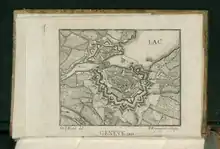
As the Geneva authorities say, the history of the city is closely related to that of the foreign communities. Ever since the migration of foreigners to Geneva, these communities have found refuge, bringing their know-how, their customs and hope of a new life. They have widely participated in the international influence of Geneva, to its economic prosperity, and also to the spreading of views and of science.
LGBT community
Many other communities or minorities are also very well represented in Geneva, including sexual minorities, with no less than three organizations: Dialogai, a gay organization; Lestime, a lesbian organization; and association 360, an LGBT organization. The Gay International Group (Geneva, Switzerland) is a good resource for gay foreigners, tourists or expatriates. Also, a new LGBT group has debuted within the University of Geneva itself, called "Think Out". This group addresses students and professors linked directly or indirectly with the matter of sexual diversity.
Religious communities
There are a lot of different communities in Geneva. Even if Geneva is supposed to be the Protestant Rome, many religions are represented in Geneva. The Plymouth Brethren have a thriving assembly there, established since the days of John Nelson Darby. Besides the Protestants, the Catholic religion becomes more influential thanks to immigration from Latin countries. The Jewish community is one of the oldest of Switzerland, and the more recent Muslim community is emerging in this tolerant city.
International organizations
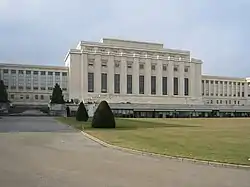

Geneva is the seat of the European headquarters of the United Nations and of many other inter-governmental organizations, including:
- The European Organization for Nuclear Research (CERN)
- The International Civil Defence Organization (ICDO)
- The International Labour Organization (ILO)
- The International Organization for Migration (IOM)
- The International Telecommunication Union (ITU)
- The Inter-Parliamentary Union (IPU)
- The United Nations High Commissioner for Human Rights (UNHCHR)
- The United Nations High Commissioner for Refugees (UNHCR)
- The United Nations Office for the Coordination of Humanitarian Affairs (OCHA)
- The World Health Organization (WHO)
- The World Intellectual Property Organization (WIPO)
- The World Meteorological Organization (WMO)
- The World Trade Organization (WTO)
Geneva was the seat of the League of Nations between 1919 and the league's dissolution in 1946. It was first housed in the Palais Wilson, and then in the Palais des Nations, which now hosts the United Nations. Numerous international non-governmental organizations have also elected Geneva as their headquarters, including:
- The Aga Khan Foundation
- The Airports Council International
- The Conference of European Churches (CEC)
- The International AIDS Society
- The International Committee of the Red Cross (ICRC)
- The International Baccalaureate program
- The International Federation of Red Cross and Red Crescent Societies (IFRC)
- The International Organization for Standardization (ISO)
- The International Road Transport Union (IRU)
- The International Union Against Cancer (UICC)
- Mandat International (MI)
- The International Committee of Committees (ICC)
- The UN Watch
- The World Business Council for Sustainable Development (WBCSD)
- The World Council of Churches (WCC)
- The World Heart Federation (WHF)
- The World Economic Forum (WEF)
- the World Organization of the Scout Movement
- The World Wide Web Virtual Library
- The International Association for the Study of Insurance Economics (also known as The Geneva Association)
- CARE International
- Youth With A Mission (YWAM)
- The international board of directors for Médecins Sans Frontières
Famous literature involving Geneva
- Belle du Seigneur by Albert Cohen, ISBN 2-07-040402-1
- Eleven Minutes by Paulo Coelho
- Frankenstein by Mary Shelley
- Geneva Nights by Clint Borgen, ISBN 0-595-27301-7
- Politics and the Arts by Jean-Jacques Rousseau
- Angels and Demons by Dan Brown
- Comic books
- Asterix in Switzerland by René Goscinny and Albert Uderzo
- The Calculus Affair by Hergé
- Film and television
- The final part of Krzysztof Kieślowski's film trilogy, Three Colors called Three Colors: Red (1994), is set in Geneva
- The sequence The Ozerov Inheritance (1972) of the television series The Persuaders! is set in Geneva
- In 2005 Academy Award-winning Syriana (2005) Matt Damon plays an energy analyst based in Geneva.
- In the television series Babylon 5, the capital of the Earth Alliance is in Geneva.
- The final scene of the movie F/X takes place in Geneva as the characters played by Bryan Brown and Brian Dennehy go there to recover a fortune from a bank.
- In the television series Mighty Morphin Power Rangers, the original Red, Yellow, and Black Rangers (Jason, Trini, and Zack) were sent to a peace conference in Geneva when their actors left the show mid-season.
- Scenes from Sean Connery's James Bond Film Goldfinger (1964) are set in Geneva. While 007 supposedly lands in Geneva, and the map device in his car indicates that he is driving north along the left side of the city, the actual footage of the car moving along what should be Rue de Lausanne is not taken in or around Geneva, but rather further north-east in the German speaking part of the country.
References
- "Arealstatistik Standard - Gemeinden nach 4 Hauptbereichen". Federal Statistical Office. Retrieved 13 January 2019.
- "Ständige Wohnbevölkerung nach Staatsangehörigkeitskategorie Geschlecht und Gemeinde; Provisorische Jahresergebnisse; 2018". Federal Statistical Office. 9 April 2019. Retrieved 11 April 2019.
- Error: Unable to display the reference properly. See the documentation for details.
- "40 – Le Léman" (Map). The municipality of Geneva and its ZIP-Codes (2011 ed.). 1:100 000. National Map 1:100'000. Wabern, Switzerland: Federal Office of Topography – swisstopo. 2009. ISBN 978-3-302-00040-4. Retrieved 11 February 2019 – via map.geo.admin.ch.
- "36 Hours in Geneva". The New York Times. Archived from the original on 2011-12-27. Retrieved 2008-02-02.
- Mercer Human Resource Consulting World-wide quality of living survey Archived 2007-04-06 at the Wayback Machine. London, 2 April 2007. Retrieved 13 January 2008.
- Swisstopo, Height reference for Switzerland Archived 2007-09-27 at the Wayback Machine. Retrieved 1 February 2007.
- https://www.extremeweatherwatch.com/cities/geneva/highest-temperatures
- "Districts of Geneva". Official Website of Geneva. Archived from the original on 2008-01-13. Retrieved 2008-02-09.
- Population of Geneva Archived 2007-04-02 at the Wayback Machine, on the website of Statistique Genève. Retrieved 1 February 2007.
- OCSTAT. Les binationaux dans le canton de Genève. Résultats du recensement fédéral de la population 2000. Communications statistiques n° 24, Geneva, December 2005.
- Inhabitants of the Canton of Geneva according to their religion Archived 2011-06-15 at the Wayback Machine, on the website of Statistique Genève. Retrieved 1 February 2007.
- "20 Minutes: Bebés et enfants ne sont pas bienvenus dans les taxis (French)". 4 July 2007. Archived from the original on 2008-01-16. Retrieved 2008-03-10.
- "Du Collège de Genève au Collège Calvin (historique)" (in French). Geneva Education Department. Archived from the original on 2008-02-18. Retrieved 2008-02-04.
- "Introduction to the Geneva Association of Private Schools". Geneva Association of Private Schools. Archived from the original on 2008-01-19. Retrieved 2008-02-04.
- Geneva (municipality) in German, French and Italian in the online Historical Dictionary of Switzerland.
- Jean de Senarclens, "Geneva: Historic Guide", Editions du Tricorne, 1995. ISBN 2-8293-0144-7
Other websites
- Official
- Geneva - Welcome to Networld
- Official website of the City of Geneva Archived 2010-02-09 at the Wayback Machine
- Official website of the Canton of Geneva (in French)
- The official Chestnut Tree Archived 2011-01-29 at the Wayback Machine, on the website of the Canton of Geneva (in French)
- Geneva Palexpo, exhibitions and congresses center, owned by the State of Geneva Archived 2009-11-30 at the Wayback Machine.
- International Geneva Motor-Show.
- Tourism
- Geneva Tourism Archived 2012-11-22 at the Wayback Machine
- Geneva public transport
- International Geneva Welcome Centre Archived 2009-12-08 at the Wayback Machine
- Brief history of Geneva
- Geneva information
- Some pictures Archived 2008-03-20 at the Wayback Machine
- Study
- Student Blog Geneva Archived 2009-11-23 at the Wayback Machine
- University of Geneva
- Other

